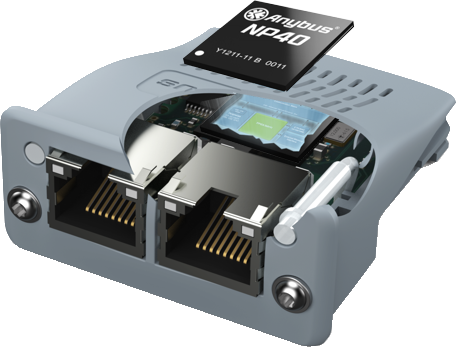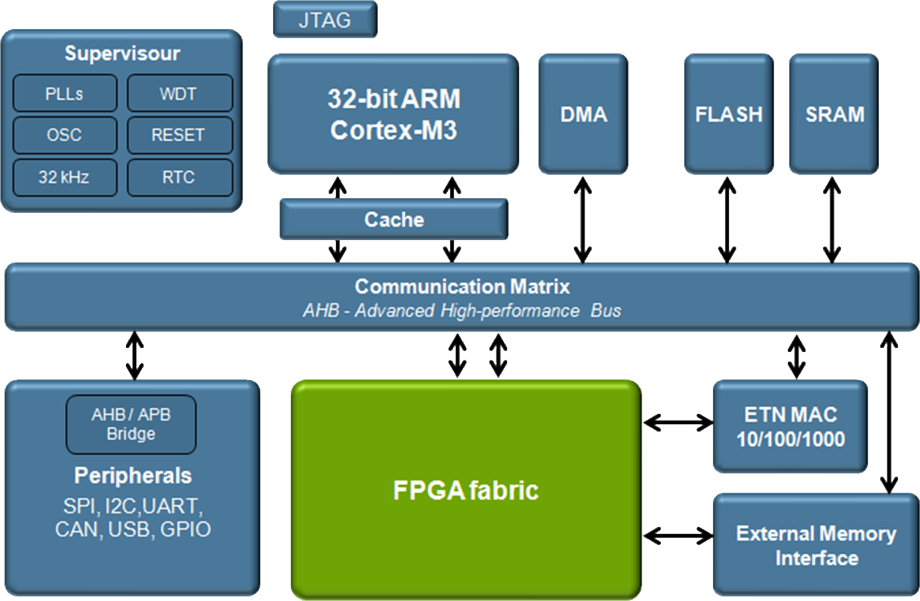Implementation
Apply Anybus CompacCom in a device
Introduction
Anybus-CompactCom is a very flexible communication solution. The modules contain the complete functionality of an industrial network interface and provides a standardized and network independent parallel or serial application interface for the host automation device.
Anybus CompactCom 40 series is an evolution of the 30 series, focusing on higher performance, faster interfacing and even higher flexibility. The 30 series is upwards compatible with the 40 series. Migration of modules M30 to M40 modules is possible.
Supported network features
CompactCom 40 series incorporates the latest protocol specification of the chosen network. HMS continuously maintains the network functionality so that your automation device always complies to the latest standards and has unlimited interoperability. All CompactCom modules are pre-certified for full network compliance with the chosen network. The network functionality includes cyclic I/O data, acyclic parameters, network, status and diagnostic information, alarm messaging and device identification. Through the host application interface the CompactCom functionality can be tailored to the communication requirements of the automation device, which allows for a high level of functional integration.
Anybus NP40 network processor
For certain powerful networks, it is possible to by-pass the ARM core, to obtain an almost immediate data transfer. The NP40 therefore enables a direct communication between the network and the host APIs resulting in a practically "zero-data delay" in demanding applications. This is a unique feature for the new NP40.
The flash based technology also provides a very low power consumption and power dissipation
IT-functions for Ethernet-versions
The CompactCom Ethernet versions contain embedded IT functions such as, an embedded dynamic web server, Telnet server, FTP server and an Email client.
Together, these IT functions allow for example, that data can be monitored via the built in web server, or using event triggered Email messages. SSI technology enables web pages and Email messages to carry dynamic content such as I/O data, configuration, and settings and then visualizing in a user friendly way.
The IT functions also include a TCP/UDP/IP socket interface. This allows applications to execute any kind of vendor specific TCP/IP based protocols using the core functionality of the Anybus-CC.
| Technical data | |
| Module type | Active - provide the full functionality of the selected fieldbus/Ethernet network |
| Application interface | Parallel - 16- of 8-bit access to 2kB Dual Port Ram with 30ns access time |
| Serial - SPI, baudrate configurable up to 20 MHz - Asynchrone UART with configurable baudrates 19.2kbps - 625kbps |
|
| Stand-alone (without host CPU) - I/O-shift register, fixed clock 12,5 MHz |
|
| 50-pin CompactFlash™ connector | |
| Status indicators | Two on-board LED's for module and network status indication |
| Processor | Anybus NP40 - ARM Cortex-M3 Core @ 166 MHz Programmable Flash and FPGA Flash-based file system — one internal and one extern (external = part of application memory). |
| Software driver | Network independent software for cyclic, acyclic data & diagnostics |
| Housing | Module in housing - voor installation via universal Anybus-CC slot of host PCB |
| Open frame - for fixed mounting on host PCB | |
| Protection class | IP20 |
| M12 versions in open frame version can support up to IP65/IP67 | |
| Dimensions | 52 x 50 x 22 mm (LxWxH, Module with housing) |
| 51 x 37 x 16 mm (LxWxH, Open frame module) | |
| Power supply | 3,3 Volt |
| Temperature range | -40 to +70 °C (Module with housing) |
| -40 to +85 °C (Open frame module) | |
| Humidity | 5-95% non-condensing |
| Certifications | UL, cUL (E214107) |






